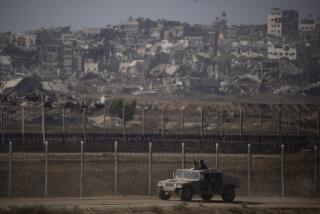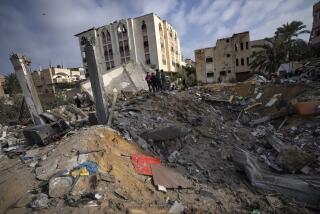Russia ignores Georgia retreat
GORI, GEORGIA — Russia dismissed signs of a Georgian military retreat and rejected calls for a cease-fire Sunday, pursuing a raging conflict with the former Soviet republic.
The international community scrambled to bring an end to the expanding conflict, which broke out late last week after Georgian troops apparently attempted to retake the pro-Russian breakaway republic of South Ossetia in a battle that left hundreds dead and Georgia, a strategic partner of the West, vulnerable.
On Sunday, Russia unleashed airstrikes and artillery barrages on Georgian positions in South Ossetia as well as near Abkhazia, another breakaway republic, and in cities of the staunchly pro-U.S. nation, hitting sites in the capital, Tbilisi, and the garrison town of Gori. Russia also began what appeared to be a naval offensive along Georgia’s Black Sea coast.
Early today, Russian planes bombed a military base and radar installation near Tbilisi, Georgia’s Interior Ministry told Reuters news service.
Despite having taken control of Tskhinvali, capital of South Ossetia, and facing widespread calls for peace, Russia showed little sign of easing its drive to punish Georgia and humiliate President Mikheil Saakashvili, 40, who is despised by Moscow’s leadership.
“We are not crazy,” Saakashvili said in an interview with CNN, asserting that troops from his small military had withdrawn from the South Ossetian capital in the face of attacks by Russia’s vastly larger armed forces. “We have no interest whatsoever in pursuing hostilities.”
Moscow was far from satisfied. Russia officials accused Georgia of simply regrouping its forces in preparation for a counterattack. Early today dozens of Georgian tanks and vehicles carrying troops passed through Gori, heading north toward South Ossetia.
Authorities ordered lights out throughout the central Georgian city, the site of a major military base that Russian warplanes had bombed. Georgian media said those remaining in Gori were scurrying into basements on hearing the Russian planes. Women and children were evacuated from the city of 50,000, many to Tbilisi, where ambulances could be heard all night and day ferrying the wounded to major hospitals.
Witnesses said Georgian military forces had suffered heavy casualties, though no reliable estimates of a death toll in the conflict were available. At the town of Khashuri, about 60 miles from Tbilisi, police had set up checkpoints and choked off all traffic heading toward the capital.
“The Russian planes are bombing!” they shouted to drivers. “It’s too dangerous! Go back!”
Russian officials declared that the conflict would continue until they saw clear signs that the Georgians were backing down.
“The Russian side did not receive any official proposals from the Georgian side to begin a peace process and to stop the bloodshed,” Anatoly Nogovitsyn, spokesman for the Russian army general staff, told reporters in Moscow. “Action, not declarations, are necessary from the Georgian side,” he said.
Moscow’s envoy to Washington, Alexander Darchiev, told CNN that Georgia must unconditionally withdraw its troops from South Ossetia and sign a document saying it would never again attack the region, which has been largely autonomous since it violently broke with the Tbilisi government in the early 1990s.
Russia has stationed troops as peacekeepers in South Ossetia and Abkhazia. It sent soldiers in Friday citing the need both to protect civilians and back up the Russian forces already in place.
Russia’s representative to the United Nations, Vitaly Churkin, exchanged heated words with American counterpart Zalmay Khalilzad, who accused Moscow of seeking “regime change” after reporting that the Russian foreign minister had told U.S. Secretary of State Condoleezza Rice in a phone call that Saakashvili “must go.”
Tensions between the U.S. and Russia underlie the conflict in the Caucasus. Moscow controlled Georgia, homeland of Josef Stalin, until the fall of the Soviet Union in 1991. Georgia’s government has in recent years thrown its lot increasingly with Washington, much to Moscow’s chagrin, pushing to join the North Atlantic Treaty Organization and supplying 2,000 troops for the U.S.-led effort in Iraq.
Those soldiers are now returning to help defend against Russia, reportedly flown home on U.S. aircraft.
At a time when the U.S. is pushing, against Moscow’s strenuous objections, to install missile defense systems in Poland and the Czech Republic, countries formerly under Russian control, the offensive against Georgia serves as a message to capitals from Eastern Europe to Central Asia about the potential perils of defying Russia within what it considers its strategic sphere of influence.
World leaders sought to cool the tensions. The United States’ deputy national security advisor, James Jeffrey, told reporters that Bush had delivered a strong message about the fighting in South Ossetia to Russian Prime Minister Vladimir Putin at the Summer Olympics in Beijing, before Putin rushed to southern Russia on Saturday to oversee the conflict.
“We have made it clear to the Russians that if the disproportionate and dangerous escalation on the Russian side continues, that this will have a significant long-term impact on U.S.-Russian relations,” he said.
French Foreign Minister Bernard Kouchner and his Finnish counterpart, Alexander Stubb, traveled to Tbilisi on Sunday in an attempt to defuse the conflict and offer humanitarian help.
Events on the ground appeared to be moving quickly. Russian television showed tanks and armored vehicles on the streets of Tskhinvali, which appeared relatively calm. Thousands of civilians have fled the conflict, mostly into Russia’s North Ossetia region. Witnesses have reported hundreds killed.
In Georgia, fears grew that Moscow was planning an all-out assault on areas outside the breakaway republics. On Sunday, Moscow expanded the fighting to Tbilisi, twice bombing the Tbilaviastroi plane factory on the capital’s outskirts, according to Georgian security officials. At least one person was injured, Georgian media reported.
The factory produces upgraded Sukhoi Su-25 combat planes, which Georgia used to bomb South Ossetia’s capital, Russia’s Interfax news service reported.
Russian-backed warplanes, artillery units and commandos loyal to the government of Abkhazia also began attacking Georgian positions around Zugdidi, a Georgian city near that separatist republic.
“We have introduced our troops into the safety area in the Gali district near Abkhazia,” Abkhaz President Sergei Bagapsh told reporters Sunday, according to Interfax. “The operation aims to restore order in the peacekeeping forces’ responsibility zone.”
Like South Ossetia, Abkhazia won de facto autonomy in a bloody war with Georgia, and is now leaning on Russia in hope of winning independence.
Russia also began moving its warships toward Georgia’s Black Sea coast and reportedly sank a Georgian naval vessel there, a claim that could not be independently confirmed.
Russia’s attacks on Georgia have left damage and sparked widespread panic in the countryside.
The Saakashvili government called on the country’s 4.6 million residents to avoid travel and asked civilians living near sensitive government installations to evacuate.
--
daragahi@latimes.com
Stack reported from Gori and Daragahi from Beirut. Times staff writer Mark Magnier in Beijing and special correspondents Tiko Ninua in Tbilisi and Svetlana Shirokova in Moscow contributed to this report.
--
Begin text of infobox
Overmatched
Comparative size of Russian, Georgian armed forces.
Military spending
Russia’s military budget is equivalent to about $40 billion this year, compared with Georgia’s $997 million.
Strength
Russia has 1.1 million soldiers, Georgia has 37,000.
Arsenals
The Russian armed forces have about 6,000 tanks and 1,700 combat aircraft. Georgia has 230 tanks and 12 combat aircraft.
Source: Associated Press
----
Tangled history
Georgia is located on the Black Sea between Turkey and Russia and was ruled by Moscow for most of the two centuries preceding the 1991 breakup of the Soviet Union. Both South Ossetia and Abkhazia fought for independence from Georgia in the early 1990s and have run their own affairs without international recognition since. Both separatist republics have close ties with Moscow, which has been deeply angered by Georgia’s bid to join NATO.
More to Read
Sign up for Essential California
The most important California stories and recommendations in your inbox every morning.
You may occasionally receive promotional content from the Los Angeles Times.










